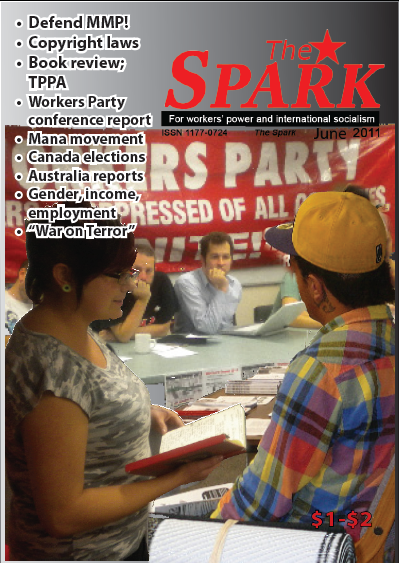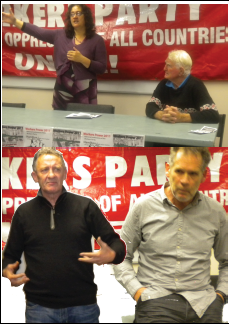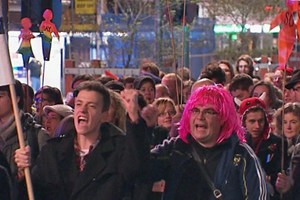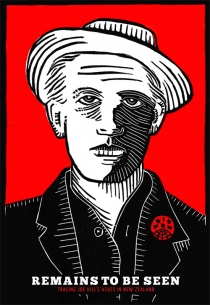 The May Issue of The Spark carried a story about a dispute involving horticulture workers at Southern Paprika Ltd in Warkworth. The owner of the Company has since made comments directed at the Union at a seminar organised by the Kiribati Protestant Church. Hamish Alexander is reported as saying:
The May Issue of The Spark carried a story about a dispute involving horticulture workers at Southern Paprika Ltd in Warkworth. The owner of the Company has since made comments directed at the Union at a seminar organised by the Kiribati Protestant Church. Hamish Alexander is reported as saying:
“One family got upset with us and decided to bring the union in, and as a company I can tell you that this has put a wall between me and my Kiribati people, and it’s a real problem.”
The Union Secretary, Ray Bianchi, has replied with the advice:
“Exercise your legal right and join the Union and ensure you get protection from manipulative Employers. Unionised Workers are treated better than non-Unionised and predominantly earn more.”
Video: Annette Sykes speaking at Workers Power 2011
Annette Sykes, a prominent lawyer and figure in the new Mana Party, spoke at the Workers Party conference in Hamilton earlier this month.
[youtube=http://www.youtube.com/watch?v=EhjE6mZL4p4]
Continue reading “Video: Annette Sykes speaking at Workers Power 2011”
Read the June issue of The Spark here

June issue of The Spark
This month’s issue of The Spark was delayed because of the involvement of the production team in organising the Workers Power 2011 conference (see report on pages 10-11). There are two additional conference reports from WP members who attended the Resistance conference in Sydney and the Socialist Party Australia conference in Melbourne. This month we have an article on the recent Canada elections from Socialist Voice (Canada) co-editor Roger Annis. A few of us met Roger in 2008 when he came to check out Unite Union in Auckland and we are pleased we have been able to establish some ongoing communication with him. In this issue we include an article that he produced for Green Left Weekly but also with The Spark in mind (we solicited shortly after GLW). So it’s a good issue in terms of expressing living internationalism! In our own backyard we’ve got new copyright laws thrown down, secretive trade negotiations going on, an electoral system referendum coming up, and the emergence of a new party with a working class constituency. Please read on and please support The Spark.
Workers Power 2011: Conference Report
Marika Pratley, Wellington branch of Workers Party
Workers Power 2011, the national conference of Workers Party was held over Queen’s Birthday weekend (June 3-6) at Hamilton’s Trade Union Centre. Over 45 people registered for what was the first socialist conference to be held in Hamilton for some decades. The conference featured a wide range of presentations delivered by speakers belonging to the Workers Party, by members of other left organizations, and by others who have participated in substantial struggles against the state and the injustices of capitalism.

Friday
The opening night featured a debate between Jared Phillips (WP) and Sue Moroney (Labour Party MP). Phillips’ case defined Labour as no longer even claiming the centre-left, quoting EPMU and leading LP figure Andrew Little’s reference to Labour and National “managing the centre”. He listed examples of active attacks that Labour has carried out against the working class and progressive forces including Operation 8 and restricting the right to strike. He outlined reasons as to why ‘lesser evilism’ was not a justifiable reason to support Labour. Moroney embraced the term ‘lesser evilism’ and said she would rather have ‘small pragmatic changes’ than a ‘glorious defeat’ by National. In reality, the speakers were clearly talking at cross-purposes.
This was followed by a presentation and lengthy discussion led by Marxist academic David Neilson who has been published in Capital and Class and Journal of Radical Economics. In summary, he outlined the need for a deeper appreciation of the shift of emphasis from the reserve army of labour to the relative population that is surplus to the requirements of capitalism. He related this to the burgeoning slum-dwelling class in under-developed countries as well as to the second tier of peripheral workers which is ever-increasing in proportion to core workers in advanced capitalist countries. In summary, he argued that this led to the current ‘workers of the world compete’ scenario rather than a ‘workers of the world unite’ scenario, and that the left had to take this into account in attempts to redefine a strategy.
Continue reading “Workers Power 2011: Conference Report”
Queer The Night speech
Speech by James Froch, key organiser of last night’s Queer The Night march, Schools Out facilitator, Wellington Gay Welfare Group trainee co-ordinator, and Workers Party Wellington Education officer.

I’m one of the organisers of this march, but I’m also here as an organiser for Schools Out.
Homophobia is something each of us has to live with. We hesitate to hold our partners hand in public because we fear straight people’s reactions, their dumbfounded staring, their screams of dyke or faggot, their fists and their bottles.
Their homophobic actions aim to rein in our various identities and orientations, to keep us off the streets and in the closets. Its intent is to make queer and trans-people live in fear.
We’re here to say we’re not afraid. We’re here to say we stand as a community against homophobia and transphobia. We’re here to fight until everyone has the right to express and explore their queerness without religious, economic, legal restrictions. Continue reading “Queer The Night speech”
New Pamphlet – Open Borders
 A new pamphlet published by the Workers Party explores our policy of open borders. The pamphlet included frequently asked questions, an essay on the racist history of New Zealand’s immigration controls, a case study of how to fight deportations and an interview with Dennis Maga of the migrant workers organisation Migrante Aotearoa.
A new pamphlet published by the Workers Party explores our policy of open borders. The pamphlet included frequently asked questions, an essay on the racist history of New Zealand’s immigration controls, a case study of how to fight deportations and an interview with Dennis Maga of the migrant workers organisation Migrante Aotearoa.
Open Borders Pamphlet (PDF)
Christchurch event: book launch 'Remains to be Seen'
A new book by Christchurch activist Jared Davidson Remains to be Seen traces the ashes of Joe Hil l — radical songwriter, union organiser and member of the Industrial Workers of the World (IWW) — from their distribution in Chicago to wartime New Zealand. Drawing on previously unseen archival material, it examines the persecution of anarchists, socialists and Wobblies in New Zealand during the First World War. It also explores how intense censorship measures — put in place by the National Coalition Government of William Massey and zealously enforced by New Zealand’s Solicitor-General, Sir John Salmond — effectively silenced and suppressed the IWW in New Zealand.
l — radical songwriter, union organiser and member of the Industrial Workers of the World (IWW) — from their distribution in Chicago to wartime New Zealand. Drawing on previously unseen archival material, it examines the persecution of anarchists, socialists and Wobblies in New Zealand during the First World War. It also explores how intense censorship measures — put in place by the National Coalition Government of William Massey and zealously enforced by New Zealand’s Solicitor-General, Sir John Salmond — effectively silenced and suppressed the IWW in New Zealand.
The book will be launched in Christchurch on Thursday June 30 at Beat Street Cafe (Corner Barbadoes and Armagh), at 5.30pm. Copies of the book will also be available for purchase. A review of Remains to be Seen will appear in the August issue of The Spark and on this website.
WP-Labour Party debate, Friday June 3, Trades Hall, Hamilton
The office of Labour MP Sue Moroney has confirmed that she will be joining a debate on the moot ‘Should working people support Labour this election year?’ Jared Phillips of the Workers Party will be arguing ‘against’ from a far-left perspective and Sue will be arguing in favour.
The structure of the debate will be that each speaker will have 10 minutes to present, followed by 5 minutes each to respond to one another,  followed by questions and contributions from the audience.
followed by questions and contributions from the audience.
Sue Moroney is the 10th-ranked candidate on Labour’s party list for the upcoming election.
The Workers Party requested the debate which will be the opening item of its annual national conference from June 3-5 in Hamilton. The full schedule is viewable at http://fightback.zoob.net/wp-content/uploads/2011/05/full-shedule-leaflet-image1.png
Report from Take the power back! , national conference of Resistance
The national conference of Resistance was held May 6th – 8th at Redfern Community Centre, Sydney. Heleyni Pratley, a member of the Wellington Branch of the Workers Party, attended on behalf of Unite Union. Her following report will be published in the June issue of The Spark.
Resistance is the youth wing of the Socialist Alliance (Australia). Topics covered during the conference included Palestine, uprisings in the Middle East, refugee detention in Australia, and the environment. The conference began with an acknowledgment that we were on stolen Aboriginal land. Around 100 people attended this conference from all over Australia. Guests included Matthew Cassel from Chicago, former assistant editor of Electronic Intifada; Antony Loewenstein, a Sydney-based independent freelance journalist and author of the book My Israel Question; and Ravindran, a youth leader from the Socialist Party of Malaysia. Overall there was a positive welcoming environment, which is important for young people to be able to debate and ask questions freely. The workshops over the weekend echoed this sentiment. Continue reading “Report from Take the power back! , national conference of Resistance”
Defend MMP in the 2011 referendum
This article by Jared Phillips will appear in the June 2011 issue of The Spark
This year New Zealand electors will vote in a national referendum, held as part of the general elections, asking them firstly to indicate whether they want to change from MMP, and secondly to indicate their preferred electoral system. The other options are First Past the Post (FPP), Preferential Voting (PV), Single Transferable Vote (STV), and Supplementary Member (SM). If a majority votes in favour of retaining MMP that decision will be binding. However, if a majority votes against retaining MMP, there will be a further referendum in 2014 whereby electors will decide between MMP and whichever alternative procedure gains the most support in the 2011 referendum. If a new system is selected in 2014 it will come into effect at the 2017 election.

Real advanced democracy can only be imposed and administered by the majority of working people through a workers‘ government. In the current period though, in which the working class has clearly not yet recovered organisationally or politically from the onslaught of neo-liberalism, it is important to ensure that the electoral system offering the most democratic electoral procedure prevails. From this point of view it is in the best interests of the working people and oppressed groups to retain MMP.
Continue reading “Defend MMP in the 2011 referendum”
